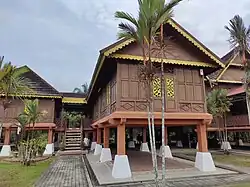Melewar of Negeri Sembilan
Raja Mahmud ibni Almarhum Sultan Abdul Jalil, known as Raja Melewar, was the first Yamtuan Besar (equivalent to a sultan) of Negeri Sembilan, Malaysia. He was a prince from the Pagaruyung Kingdom in the island of Sumatra, now situated within Indonesia.
| Melewar | |||||||||
|---|---|---|---|---|---|---|---|---|---|
| Yamtuan Besar of Negeri Sembilan | |||||||||
 An artist's interpretation of Raja Melewar. | |||||||||
| Predecessor | position established | ||||||||
| Successor | Tuanku Raja Hitam | ||||||||
| 1st Yamtuan Besar of Negeri Sembilan | |||||||||
| Reign | 1773 – 1795 | ||||||||
| Born | Pagaruyung Kingdom | ||||||||
| Died | 1795 Rembau, Negeri Sembilan | ||||||||
| Burial | |||||||||
| Spouse | Che Seni binti Datuk Penghulu Naam Che Puan Jangka binti Datuk Penghulu Ulu Muar | ||||||||
| Issue | Tunku Puan Aishah Raja Khalad Tunku Kadir | ||||||||
| |||||||||
| Dynasty | Pagaruyung | ||||||||
| Father | Sultan Abdul Jalil Johan Berdaulat | ||||||||
| Mother | Ratna Indusari | ||||||||
| Religion | Sunni Islam | ||||||||
History

The Minangkabau people were the first migrant community to settle in the area north of the Malacca Sultanate which eventually formed the confederation of Negeri Sembilan circa the 15th century. After the Portuguese invaded Malacca in 1511, it then became a protectorate of its successor, the Sultanate of Johor. The population began to control local politics.
By 1760, Johor, which was having trouble from the Dutch, allowed the state to appoint a ruler from Minangkabau in Sumatra.
Between 1760 and 1770, a council of leaders known as the datuk-datuk penghulu luak (the predecessor of the datuk-datuk undang today) left for Pagaruyung in Minangkabau in search of a leader. The Yamtuan of Pagaruyung, who was believed to be a descendant of Alexander the Great, gave them a leader in the form of his son, Raja Mahmud.[1]
Before Raja Mahmud left for the Malay Peninsula, a royalty named Raja Khatib was sent to Negeri Sembilan to oversee Raja Mahmud's coronation preparations. However, upon his arrival to Negeri Sembilan, Raja Khatib deceived the locals and claimed to be the prince sent from Pagaruyung. The locals believed him, and Raja Khatib was deemed the new king. As for Raja Mahmud, he first sailed to Johor to ask for the Sultan of Johor's consent to rule over Negeri Sembilan. Sultan Mahmud Shah III, the Sultan of Johor of that period, did not object and conferred upon Raja Mahmud the authority to reign over Negeri Sembilan. Raja Mahmud's expedition marched to Negeri Sembilan through Naning.
At Naning, Raja Mahmud's forces met Bugis warchief Daeng Kemboja. War ensued, which ended with the Bugis forces defeated. Upon his arrival to Negeri Sembilan in 1773, Raja Mahmud was deemed king and crowned as Yamtuan Besar in Kampung Penajis in Rembau, as Raja Melewar. Raja Melewar learned of Raja Khatib's scheme and, becoming the undisputed ruler of the state, declared war against Raja Khatib. Raja Melewar later relocated his palace to Seri Menanti, which remains the royal capital of Negeri Sembilan to this day.
Death and legacy

In 1795, Raja Melewar fell ill while visiting Rembau, and died soon after. He was buried in Astana Raja along with his consort and two other warriors. Following his death, rather than selecting his son as their new leader, the datuk-datuk penghulu luak once again journeyed to their ancestral land. The Yamtuan of Pagaruyung gave another son, Raja Hitam, to serve as their new Yamtuan. Raja Hitam married Raja Melewar's daughter, Tengku Aishah, but they did not have children.[2]
Selecting a ruler of Negeri Sembilan by a council of ruling chiefs in the state, or the datuk-datuk undang, became an implemented system. Under which, the person selected assumes the position of Yang di-Pertuan Besar, or Yamtuan Besar, a post that began in 1773. This system would become the inspiration behind the position of the Yang di-Pertuan Agong (Paramount Ruler) of Malaysia, where each ruler from the nine monarchical states is elected by the Conference of Rulers (Malay: Majlis Raja-Raja) every 5 years.
References
- History behind Negri's unique selection of ruler Archived 2009-01-22 at the Wayback Machine, The New Straits Times, 29 December 2008.
- History behind Negri's unique selection of ruler Archived 2009-01-22 at the Wayback Machine, The New Straits Times, 29 December 2008.
- Information from Warisan Diraja Negri Sembilan Darul Khusus
